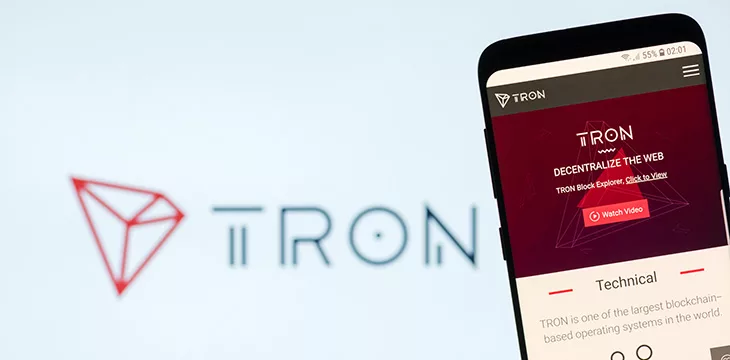Justin Sun and Tron have threatened to sue CoinGeek for reporting on blockchain links to terrorism.

Justin Sun is threatening legal action against CoinGeek over reports of the Tron blockchain’s growing popularity with Islamic terrorist groups.
On November 29, CoinGeek was contacted by a Tron representative regarding an article published on the site. The article detailed Reuters’ latest report on a terrorist group switching its blockchain-based financial activities from BTC to Tron.
A Tron spokesperson claimed that the “tone” of the CoinGeek article was “defamatory toward Tron and Justin Sun in almost every respect.” For example, a Tron representative took exception to CoinGeek’s claim that “Sun has long been accustomed to ignoring court orders and law enforcement ‘requests’.”
The article in question quoted a former Mossad agent who told CNBC that Tron was “dodging Israel’s requests to block accounts linked to Hamas.” CoinGeek also cited a recent Amsterdam court ruling imposing financial penalties on the parent company of Sun’s HTX Exchange (formerly Huobi) for defying a court order to freeze wallets containing digital assets obtained through fraudulent means from Dutch citizens. I did.
The CoinGeek article mentioned Sun. Twitter Tron said that while it is “committed to combating terrorist financing,” the chain’s “top priority” remains “to provide instant, affordable and reliable transactions.” Sun also said, “We are deeply grateful to everyone in the industry who is contributing to the widespread adoption of cryptocurrencies.”
“(g)Depending on context, Sun’s remarks could be interpreted as ‘terrorists have rights too,’” the CoinGeek article said. Although the article acknowledged that this “might be a brute interpretation,” CoinGeek told Tron’s representative that Sun’s comments were: Tron’s priorities are lower priority We are taking steps to reduce the likelihood that terrorist groups will use TRON to fund their activities.
In a follow-up communication, Tron’s representative claimed that neither Sun nor Tron had the ability to freeze/seize Tron wallets due to its “public and decentralized” nature. CoinGeek responded by pointing out that Tron’s Delegated Proof of Stake (DPoS) consensus mechanism relies on a small number of Super Representatives (SRs) to verify Tron transactions. CoinGeek claimed that these SRs have the ability to prevent certain transactions from being included in new blocks in the chain.
After mining pools on other chains recently demonstrated their ability to prevent transactions designated by the U.S. Treasury’s Office of Foreign Assets Control (OFAC) from being created into new blocks, CoinGeek has investigated whether Tron has begun discussions with SRs that include multiple ranks. I asked whether or not. Entity associated with Sun – for a similar effort to Tron’s SR. CoinGeek did not receive a response to this question from a Tron representative.
Point/counterpoint
On November 30, CoinGeek received a letter from the Harder Stonerock law firm, Tron Network Ltd.’s litigation attorney.
The letter came in a separate article about a letter sent to the U.S. Senate Banking Committee by watchdog group the Campaign for Accountability (CFA), which accused CoinGeek of making “false and defamatory statements.” The CFA asked the committee to “turn its attention to the role that cryptocurrency entrepreneur Justin Sun, his blockchain TRON, and US-based stablecoin issuer Circle may play in financing terrorist organizations.” I did.
Harder Stonerock listed an eight-point summary of the CoinGeek article, citing quotes the company believes are “false and defamatory.” The letter says Harder Stonerock “hereby demands that CoinGeek remove the defamatory statements from the story and publish a full, fair, and prominent retraction and apology for each statement.”
Of these eight points, three are direct quotes from the CFA letter, and the fourth is a CoinGeek summary of the CFA’s call to target malicious actors’ use of ‘chain hopping’ to obfuscate the trail of illicit assets. That’s it. Neither Sun nor Tron are mentioned in this quote.
Another point Harder Stonerock cited was from a November 12 Wall Street Journal article. Similar excerpts from the WSJ article have been cited in reports by other blockchain media outlets, including CoinDesk. social media.
That leaves just the three things Harder Stonerock cited that are purely what CoinGeek is doing. Headlines (“Circles Target ‘Cryptocurrency’ Terrorist Financing in Letter to U.S. Senator Justin Sun”); Leading (“Justin Sun’s Tron blockchain is once again being flagged as a funding option for terrorist groups, and USDC issuer Circle is coming under rare political attack over its Tron ties”); And there are also some quotes from the article that say Sun “spent most of his life on the run from various institutions.”
CoinGeek claims its headlines or leads do not contain any defamatory information. In fact, the day before CoinGeek received a letter from Harder Stonerock of the Atlantic Council GeoEconomic Center tweeted Here’s a clip from a recent event where a panelist declared, “92% of terrorist financing occurs on the TRON blockchain, mostly on the stablecoin Tether.”
On Thursday, we also met with Chinese blockchain analyst Bitrace. Twitter Tron “has become a blockchain network primarily used for black and gray activities.” The Israeli intelligence agency’s actions also detailed Tron’s growing popularity among terrorist groups, which led to reporting by mainstream media outlets such as Forbes.
Other blockchain media outlets, including Cointelegraph, DL News, and others, also reported on the original CFA letter, citing some of the same language as CoinGeek. It is unclear whether Sun or Tron has issued similar threatening letters to these outlets for reporting the same publicly available information.
Circle issued its own rebuttal to the CFA letter, devoting an entire section to distancing itself from Sun/Tron. Circle claimed it “does not ‘bank’ Justin Sun.” Neither Mr. Sun nor any entities owned or controlled by Mr. Sun, including the TRON Foundation or Huobi Global, currently have a Circle account.” Circle noted that it “terminated all accounts held by Mr. Sun and his affiliates in February 2023,” without providing details about why Circle took this action.
running sun
In response to point 8 of the Harder Stonerock letter, which mentions Sun’s flight from multiple organizations, The Verge published an in-depth analysis of Sun/Tron in March 2022 titled “Tron Founder Justin Sun and His Many Exoduses.”.” Among other details, the article mentions that after Tron’s ICO for its TRX token in September 2017, Sun suddenly left China for South Korea (and from there to the United States).
A week later, Mr. Sun was waiting for a flight at Incheon International Airport due to the Chinese government’s ICO ban. A source who heard him tell this story said Justin believed he was a fugitive and was ready to leave immediately. Sun Yat-sen’s actual escape route from Beijing to Seoul is still shrouded in rumors. But the reason he ran away was simple. He probably knew the ICO ban was coming and went through with it anyway.
The Verge also detailed Sun’s legal risks in the United States.
The U.S. Attorney’s Office for the Southern District of New York, which mainly handles financial crimes on Wall Street, is seeking evidence of crimes against Justin Sun. The investigation is being led by the FBI. (…) As the manhunt tightens around the Sun, a grand jury is looking into a long list of potential charges. According to the subpoenas (one of which was shown to me): wire fraud, conspiracy or intent to commit wire fraud, fraud, money laundering, spending the spoils of a criminal enterprise, failing to register securities and lying about them, aiding and abetting a crime. It is an act of encouraging and conspiring to deceive the United States.
Sun left the United States just before the pandemic hit and never returned.
Recently, the U.S. Securities and Exchange Commission (SEC) detailed its difficulties in finding Sun to serve a subpoena in connection with the SEC’s civil action for offering unregistered securities to the public. The complaint was filed in March, but it wasn’t until mid-July that the SEC was able to successfully pursue a subpoena against Sun. The delay occurred despite the SEC making “multiple attempts to known addresses” from Sun’s reported Singapore home base and from Sun. Twitter His perception of the date the complaint was filed.
you can’t handle the truth
Harder Stonerock is a heavyweight crew that successfully handled civil lawsuits on behalf of Hulk Hogan, former President Donald Trump, and former First Lady Melania Trump. Therefore, it is not a good idea to blindly ignore the threat of litigation.
However, CoinGeek believes that the media has a responsibility to report on malicious actors, especially in the blockchain sector. The blockchain sector has endured a tsunami of regulatory and criminal crackdowns over the past few years based on the actions of the same malicious actors. It is these individuals and organizations that have tainted the public perception of digital assets and contributed to slowing corporate adoption of blockchain technology.
Sun has long touted his close relationship with Binance founder Changpeng ‘CZ’ Zhao, despite CZ’s efforts to downplay this relationship as professional rather than personal. But CZ’s recent $4.3 billion settlement with the U.S. Department of Justice to atone for Binance’s years of neglecting its anti-money laundering and ‘know your customer’ (KYC) responsibilities provides a hint of Sun’s future fate.
The Verge article details how after Sun acquired the Poloniex exchange from Circle in 2019, he informed employees that they would no longer have to adhere to the strict KYC rules that Circle had imposed on Poloniex customers.
Sun also began impatiently pushing Poloniex’s KYC rules, which delayed Poloniex’s user adoption in China. A former employee said the gridlock had angered Sun. “Fake your KYC!” He screamed at one meeting. “FALSE!”
To approve new customers as quickly as possible, Poloniex established an automated KYC system, but according to former employees, this was permissive. They explained that they rubber stamp virtually every type of government identification card. “I don’t mind submitting a picture of Daffy Duck.”
Before pleading guilty last month, CZ had made a habit of using social media platforms to deny each new report detailing alleged criminal activities at Binance. Sun seems determined to refute claims that he and his platform could be tarred in the same way. CZ is currently awaiting a sentence of between 18 months and 10 years in a U.S. prison. Is Sun currently negotiating a plea agreement with U.S. prosecutors? Only time will tell. So watch this space.
Are you new to blockchain? To learn more about blockchain technology, check out CoinGeek’s Blockchain for Beginners section, our ultimate resource guide.
Source: https://coingeek.com/justin-sun-tron-threaten-to-sue-coingeek-for-reporting-on-blockchain-terror-ties/



